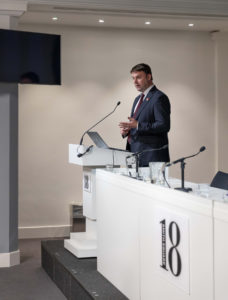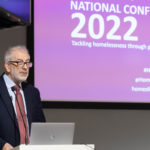The Chief Executive of national homelessness charity Crisis has urged housing associations to rediscover the driving purpose of the housing sector to help end homelessness.
In his speech at the Homes for Cathy National Conference on 10th October — coinciding with World Homeless Day — Matt Downie challenged housing associations to show “leadership, creativity and moral determination” in finding ways to house people who are homeless, saying: “There are organisations that not only house people out of homelessness without going bankrupt, they make it their mission to do so, and structure their finances to meet that goal.”
He added: “If you are not in the business of housing people who most need it, what on earth is your business for?”
He also criticised housing associations who are “simply in it to make a profit and make excuses” and called on government to back Homes for Cathy’s campaign for better regulation and reporting around housing associations’ homelessness work.

Matt Downie was addressing an audience of 100 senior leaders from housing, the third sector and local government attending the event organised by the Homes for Cathy group, a nationwide alliance of housing associations and charities dedicated to raising awareness of homelessness and encouraging the housing sector to do more to address the issue.
His challenge to the sector was echoed in a keynote address by Lord Bob Kerslake, former Head of the Civil Service and the current Chair of Peabody, who said that housing associations “do not have a legal duty to address homelessness, however they do have a social responsibility” and stressed that the progress made over the past two years since the recommendations of the Kerslake Commission on Homelessness and Rough Sleeping were now being “put at risk” by the cost-of-living crisis.
In her conference speech, National Housing Federation Chief Executive, Kate Henderson, asserted that a lack of social homes had contributed to homelessness, citing that of the 8.5 million people in housing need, 4.5 million are “best suited to social housing”, yet only 250,000 to 350,000 social home lets are made per year.
The Homes for Cathy group, led by David Bogle, Chief Executive of Hightown Housing Association, is lobbying for amendments to the Social Housing Regulation Bill that would add to the Regulator’s remit an additional objective of safeguarding and promoting the interests of people experiencing homelessness and would give the Regulator the ability to set consumer standards for registered providers on their work in this area.
In his opening address, David Bogle said: “Inevitably, what gets measured gets done. We think these amendments would be a game changer and would focus boards and senior staff of all housing associations on their lettings statistics, their eviction figures and their tenancy sustainment work and of course, encourage them to build more affordable and social homes for rent.”
He stressed the “danger” of the new consumer regulation role of the Regulator leading to a “reduced focus” on those who are not yet tenants, including homeless people.
Conference attendees heard examples of best practice around homelessness prevention and provision from Homes for Cathy member organisations, including Bromford, which has worked closely with its biggest four local authority partners to remove barriers to homeless households accessing its properties, and Broadland, which through a cultural shift and ‘eviction as a last resort’ ethos, has reduced its evictions to under 3%.
Homes for Cathy members adopt a framework of nine commitments — developed with Crisis — that focus on building stronger partnerships with local authorities to develop homelessness strategies and solutions, operating flexible policies around allocations and eligibility, finding constructive ways to avoid evictions into homelessness, meeting the needs of vulnerable groups including migrants and promoting tenancy sustainment.
Header image shows Lord Bob Kerslake delivering the keynote address at the Homes for Cathy National Conference.









